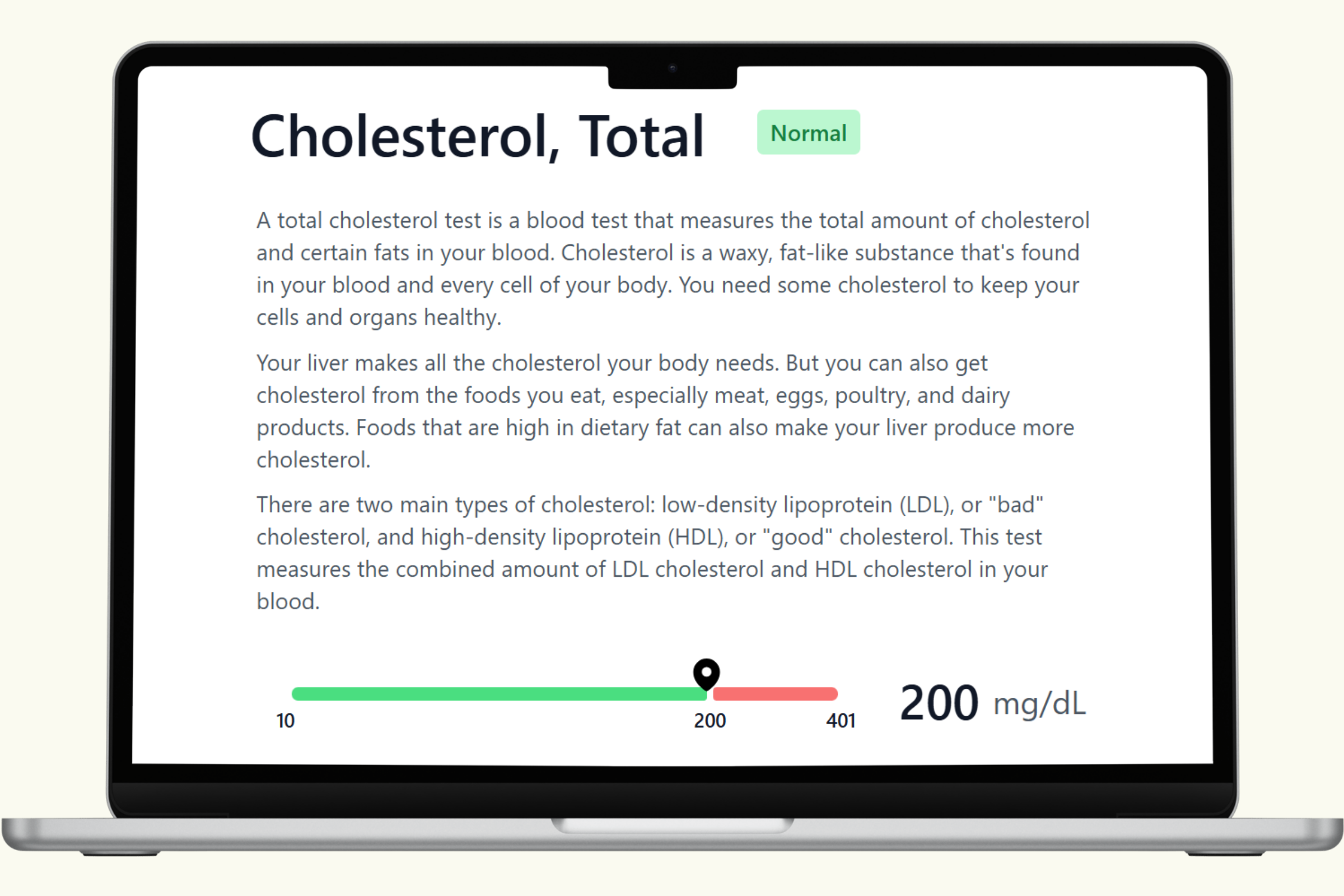Total Cholesterol Blood Test
The Total Cholesterol Test measures the overall cholesterol level in your blood, including LDL (“bad” cholesterol), HDL (“good” cholesterol), and VLDL (which carries triglycerides). This test provides an important snapshot of your cardiovascular health and helps assess your risk for heart disease, stroke, and atherosclerosis. While cholesterol is essential for many body functions—including building cell membranes, producing hormones, and aiding digestion—too much circulating cholesterol can be harmful, especially when combined with other risk factors.
The PlexusDx Diabetes & Heart Health Blood Test includes a total cholesterol measurement to give you a clear picture of your lipid balance. Using a simple at-home dried blood spot (DBS) collection on an ADX card, you can check your cholesterol status without visiting a clinic, making it easier to stay proactive about your heart health.
What the Total Cholesterol Test Measures
This test reports the sum of all types of cholesterol in your blood:
- LDL (Low-Density Lipoprotein): Known as “bad” cholesterol, which can contribute to artery plaque buildup.
- HDL (High-Density Lipoprotein): “Good” cholesterol that helps remove excess cholesterol from the bloodstream.
- VLDL (Very Low-Density Lipoprotein): Cholesterol particles that carry triglycerides and also contribute to atherosclerosis risk.
While this test does not separate each type, it provides an overall view of your cholesterol balance and is often used as the starting point for cardiovascular screening.
Why Total Cholesterol Matters
High total cholesterol is one of the most well-known risk factors for cardiovascular disease. Elevated levels can signal imbalances in LDL, HDL, or VLDL that increase the likelihood of plaque buildup in arteries. Over time, this may lead to narrowed blood vessels, reduced circulation, and higher risk of heart attack or stroke. On the other hand, very low cholesterol can sometimes indicate issues such as poor nutrient absorption, malnutrition, or certain chronic illnesses.
This test is also important for monitoring treatment effectiveness. If you are making lifestyle changes or taking cholesterol-lowering medications, checking your total cholesterol over time helps track progress and adjust care strategies.
Reference and Functional Ranges
Commonly accepted reference ranges for total cholesterol are:
- Desirable: Below 200 mg/dL
- Borderline High: 200–239 mg/dL
- High: 240 mg/dL or above
From a functional and preventive medicine perspective, the goal is typically to keep total cholesterol closer to 160–180 mg/dL, while also considering LDL, HDL, triglycerides, and cholesterol ratios for a more complete picture of risk.
How the Test is Collected
The PlexusDx Diabetes & Heart Health Blood Test uses a dried blood spot (DBS) collection method with an ADX card. After a simple finger prick, you place a few drops of blood on the card and mail it to the lab. This method is:
- Convenient and non-invasive
- Accurate and clinically validated
- Less invasive than traditional venous draws
- Well-suited for routine monitoring over time
Factors That Influence Total Cholesterol
Many lifestyle and medical factors affect total cholesterol levels:
- Diet: Diets high in saturated fats, trans fats, and processed foods can raise cholesterol. Diets rich in fiber, plant sterols, and omega-3 fats can help lower it.
- Exercise: Regular activity helps lower LDL and raise HDL, improving overall cholesterol balance.
- Weight: Obesity and central fat distribution often raise total cholesterol, while weight loss helps normalize levels.
- Smoking: Lowers protective HDL cholesterol, negatively affecting the balance.
- Alcohol: Moderate intake may raise HDL, but excess increases triglycerides and total cholesterol.
- Genetics: Inherited lipid disorders, such as familial hypercholesterolemia, can cause very high cholesterol levels regardless of lifestyle.
- Medical conditions: Diabetes, hypothyroidism, kidney disease, and liver conditions often disrupt cholesterol regulation.
How to Improve Total Cholesterol
Managing cholesterol usually involves a combination of lifestyle changes and, when necessary, medication:
- Adopt a heart-healthy diet: Emphasize fruits, vegetables, whole grains, legumes, and healthy fats like those found in fish, nuts, and olive oil.
- Increase soluble fiber: Foods such as oats, beans, and flaxseed help bind cholesterol in the digestive tract and reduce absorption.
- Exercise regularly: Aim for at least 150 minutes of aerobic activity per week to improve lipid metabolism.
- Quit smoking: Improves HDL and reduces cardiovascular risk.
- Limit alcohol: Avoid excessive drinking, which can raise cholesterol and triglycerides.
- Maintain a healthy weight: Weight loss can improve cholesterol balance significantly.
- Medication: Statins, PCSK9 inhibitors, and other therapies may be prescribed if lifestyle changes alone are insufficient.
Why Pair Total Cholesterol with Other Biomarkers?
Total cholesterol is an excellent starting point, but it does not provide the full story on its own. The PlexusDx Diabetes & Heart Health Blood Test also measures LDL, HDL, VLDL, triglycerides, and cholesterol ratios, in addition to glucose and hemoglobin A1C. Together, these biomarkers provide a detailed picture of both cardiovascular and metabolic health, allowing for more personalized strategies to prevent disease and improve wellness.
Take Charge of Your Heart Health
The Total Cholesterol Test is a cornerstone of cardiovascular screening and preventive health. With PlexusDx’s at-home collection method, you can easily monitor your cholesterol levels, understand your risks, and track progress over time. Whether you are focused on prevention, actively managing high cholesterol, or simply maintaining your health, this test offers the insights you need to protect your heart and support long-term wellness.

Share:
HbA1C Blood Test
HDL Blood Test